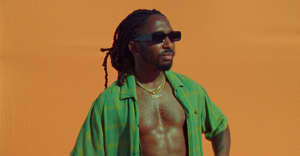In 2012, the Recording Academy, alongside R&B producer Ivan Barias, created the Grammys' Best Urban Contemporary Album category to make a space for "anyone that's singing on urban radio, [sic] not doing anything that you would call traditional R&B." It raised some controversy about whether or not the actual intention of its inclusion properly reflected the styles of its featured artist. The term, “urban” is associated with black music and contemporary is defined as something new—or as the Academy explains it, as not “traditional R&B.”
The 2016 nominees in the category are Kehlani, The Internet, Lianne La Havas, The Weeknd and Miguel, who all make very different music from one another. The non-white color of their skin is probably their most solid connecting thread, but perhaps the vagueness of the classification binds them together as captivating outliers creating material in lanes of their own.
The FADER spoke with Lianne La Havas, The Internet, and Kehlani over the phone about their sentiments on being nominated in the category. (Miguel and The Weeknd declined to take part in this feature.)
The 20 year-old FADER cover star says that she's "honored" to be nominated in the category with other great artists who she listens to on a daily basis and share her unconventional streak. I think it's cool that it's considered nontraditional," she said over the phone from L.A. "I never called it traditional R&B either, I think it is urban contemporary. There's all types of feels on that mixtape, it's not a consistent one type of sound—it's very mixed. I think it's cool that it's in a box that's not necessarily a box.”
Kehlani’s Grammy nominated album You Should Be Here is a fusion of mashup of ballads, upbeat anthems and laid back tracks that serve as a strong introduction to the young star’s sound.
“I feel really cool that I'm being categorized in this way because I don't think it's that specific where it necessarily puts me in a box. It's a pretty open [sic] category—especially being that the other albums in the category are very different.”
The Internet, the six person group who got a nod for Ego Death, share the same desire to be free from the limitations of a specific genre. The crew’s strong jazz sounds and soothing lead vocals from singer/songwriter Syd Tha Kid undoubtedly places the album outside of a linear classification. The Internet told The FADER over email, that they tossed out genres “a while ago” and they’ve just been calling their music, “soul.” In terms of being considered under the “Urban Contemporary” umbrella, the group feels that it’s the best fit for what they’ve created and that R&B wouldn’t have made sense.
Syd Tha Kid believes what makes their music out of the box is their approach. “Matt isn't a traditional musician and I'm not a traditional singer. Pat, Chris, Jameel, and Steve each have their own unique styles as well and when you bring all of that to one table, you're bound to get something you've never heard before,” she wrote.
The notion of what exactly urban means in this regard is one that stellar songstress Lianne La Havas is still trying to work through. The U.K. singer's album Blood is up for the award and had some pause about the language of the category's name but also an appreciation for its loose boundaries.
“The type of music I'm drawn to is the kind of music I cannot call anything," she said. "If I can liken it to anything, that immediately puts me off it. So I aspire to have music that you can't put your finger on necessarily. I think there's something kind of enticing about that and the untouchable-ness of that is what attracts me to certain music. And, therefore, perhaps create a new genre where it doesn't matter what you look like or where your parents came from or what you sing like—it just matters what it feels like."
Havas expressed that she wants the music that she shares with the world to be recognized not just according to her skin color, but for feelings that it inspires.
"The term urban contemporary is a new one for me," she explained. "I have not heard it before, I'll be honest. My own personal journey as a musician, I found that I come across this term a lot—urban. I don't know if it's the right way to say what it's trying to say, perhaps. I think it just implies the color of my skin rather than the content of the music. My influence comes from so many places and I always say that I wish not to be categorized and I aspire not to be categorized.”
But while she doesn't wish to be classified, she recognizes the need for it and hopes that the time will bring some clarity to the situation: “I understand for a huge prestigious award ceremony such as the Grammys they need to find somewhere to put all these amazing records they've nominated. I think it is an interesting choice of category name, but I think also that music will outlive that kind of categorization. I wonder if it will be the same in the future. I hope maybe not."


